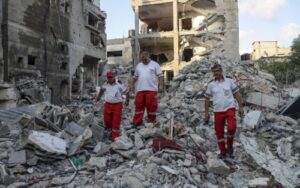
The National Interest Foundation Newsletter
Issue 156, August 11, 2022
Welcome to our NIF Newsletter. In this week’s headlines: Israeli bombardment of the Gaza Strip targets hospitals and civilian areas as hundreds of Palestinians are wounded and dozens killed including children, the European Union announces that it has put forward a final draft text to try and revive the 2015 Iran nuclear deal following days of indirect talks between U.S. and Iranian officials, the Egyptian government faces financial difficulties and plans to sell public assets to China and others, and the Federal Bureau of Investigation (FBI) searches former President Trump’s Mar-a-Lago residence in Florida as part of a probe into the alleged mishandling of White House records.
Israeli Bombardment of the Gaza Strip

Several days of Israeli bombardment in Gaza killed 16 Palestinian children. (Photo from AFP)
Israeli Bombardment of the Gaza Strip Targets Hospitals and Civilian Areas as Hundreds of Palestinians are Wounded and Dozens Killed Including Children
This past weekend, numerous days of Israeli bombardment on the besieged Gaza Strip left hundreds of Palestinians wounded and dozens killed, including children. The aerial assaults were carried out against hospitals, residential neighborhoods, schools, health facilities, and other civilian infrastructure. An estimated 1,675 housing units were damaged, with 88 of these rendered uninhabitable because of the attacks. Human rights groups denounced the targeting of densely-populated areas and reiterated that it is a flagrant violation of international law. Impartial observers noted Israel’s history of committing these types of human rights abuses and war crimes in the Gaza Strip and elsewhere. In addition to lamenting the deplorable killing of children and civilians, social justice activists also decry how destructive actions like this exacerbate the already dire humanitarian conditions in Gaza and only serve to fuel animosity.
As a result of the devastating Israeli barrage of aerial assaults on the Gaza Strip during the preceding week, reports began to emerge that hospitals there were becoming overwhelmed. Throughout the course of the multi-day crisis before the eventual cessation of bombardment, health officials had issued warnings regarding a potential imminent halt in the provision of medical services due to a lack of fuel needed to operate the electricity generators in hospitals and health facilities across the Gaza Strip. They outlined how shortcomings in the Gazan health sector were an unquestionable result of the blockade imposed on the territory with a clear scarcity of essential medicines and medical equipment and that now, the electricity woes brought about by the bombardment were worsening the already insufficient circumstances, paralyzing health departments like the intensive care unit, oxygen-generating stations, and nurseries. As one hospital director expressed, “there are injuries which need surgeries, wounded in intensive care departments in critical conditions…with the numbers indicating the excessive use of force in the Israeli bombing.” Similarly to hospitals and medical facilities, civil defense workers in Gaza face significant difficulties as well because of a shortage of needed supplies and rescue equipment.
Israel’s disproportionate and unprovoked air strikes on the Gaza Strip triggered rebuke from the international community. The United Nations Special Rapporteur on the situation of human rights in the Palestinian territories occupied since 1967 commented that “I condemn Israel’s air strikes in Gaza to allegedly ‘deter’ Islamic Jihad’s possible retaliation for its leader’s arrest. As International Law only permits the use of force in self-defense, Operation Breaking Dawn is a flagrant act of aggression.” She labeled the bombing campaign as “illegal, immoral, and irresponsible.” Heads of rights groups and non-governmental organizations (NGOs) also bemoaned the fact that children and families in the Gaza Strip too often unfairly bear the brunt of Israel’s repeated military offensives in the Palestinian territory. Another particularly troubling element of this is how vulnerable civilians in overcrowded Gazan refugee camps are subjected to the aerial assaults. Multiple accounts of residents in these facilities being killed or trapped before later being rescued emerged in the wake of the Israeli bombardment.
All told, at least 45 people, including 16 children, were killed during the three days of violence that began last Friday when Israeli air strikes were launched on the Gaza Strip. According to officials, upwards of 360 others were wounded, nearly half of these being children and teenagers.
Latest on Iran Nuclear Deal Revival Talks

The final draft text has been put in front of negotiators from Washington and Tehran. (Photo from AP)
The European Union Announces That It Has Put Forward a Final Draft Text to Try and Revive the 2015 Iran Nuclear Deal Following Days of Indirect Talks Between U.S. and Iranian Officials
The European Union (EU) has put forth a final ultimatum to Iran in the last-ditch efforts to revive the Joint Comprehensive Plan of Action (JCPOA), the 2015 agreement to minimize Iran’s access and ability to produce weapons grade uranium. This is not the first time that the EU has put forth a deal expressing that it would be final, but after a multitude of attempts, it appears that intermediary negotiators’ patience has gradually worn thin. Due to several recent failures, some U.S. officials are skeptical that Iran is prepared to do what it takes to roll back the programs necessary to reimplement the deal. There are analysts and observers however that disagree with that sentiment, saying that Iran has actually inched closer to meeting EU and U.S. demands than previously thought. This includes claims from certain parties involved in the negotiations that Iran has made notable concessions on two terms: the rolling back of the stipulation that the United States remove the Islamic Revolutionary Guard Corps (IRGC) from its official list of foreign terrorist organizations and no longer demanding a guarantee from the United States that a future president will not withdraw from the deal – as was done by former President Trump back in 2018. These have been a couple of the main roadblocks impeding the prospects for revival of the deal.
Joseph Cirincione, a nuclear policy expert, stated that “We are closer than we have been since the deal was all but done last May, before the talks suspended for the Iranian elections.” He went on to voice his belief that this could happen. Other analysts are not as optimistic. For example, Ali Vaez – the Iran Director for the International Crisis Group – points out that even a single disagreement could entirely derail the possibility of successful restoration and abiding of the JCPOA. A breakthrough in negotiations would give U.S. President Biden a much-needed foreign policy win and potentially boost sagging approval ratings. There is also speculation that it could conversely hurt him even if it is revived, as a host of Republicans have contentions with the deal while some Democrats are opposed to the JCPOA in its original form. Either way, from a domestic standpoint, it is likely to affect the upcoming midterm elections in the United States, with a significant number of Democratic candidates facing tough odds.
For an enduring breakthrough to happen, steps need to be taken by both sides to be in compliance with the new deal, if it were to go through. These measures include ramping down enrichment processes and setting up methods to ensure compliance. This would take months at best and could still lead to a dissolution of the deal, as it is not unprecedented to exit the deal unilaterally. Many critics have also pointed out that even if the agreement to restore the arrangement takes place, Iran still has the material and the means to make a nuclear weapon with their current resources.
Proponents say that if this deal were to go through, it would likely enhance stability in the Middle East and help Iran grow their economy. Skeptics on the other hand argue that it would only take away pressure on Iran and open the door for the regime there to expand its influence.
Egypt’s Financial Crisis

Egypt is looking to privatize large portions of its economy in an attempt to alleviate financial woes. (Photo from Getty Images)
The Egyptian Government Faces Financial Difficulties and Plans to Sell Public Assets to China and Others
As the Egyptian economy continues to reel from the shockwaves of the war in Ukraine and other circumstances, the country is beginning to explore more desperate options. Cairo has been considering the sale and privatization of many of its public assets including ports, banks, hotels, telecommunications companies, infrastructure projects, energy and water desalination, business sector companies, and entities affiliated with the armed forces. The planned sale would be to China and other countries, in addition to private businesses. The main goal of these proposed sales would be to “rein in the participation of the government and the companies owned by the armed forces in economic activities,” according to Egyptian political scientists. To meet this aim, the government hopes to allow the private sector to control 65% of the economy, a notable jump from the current 30% level. The assets and projects, valued at $40 billion, will either be sold to the private sector or offered for partnership over the next several years.
In a continued effort to try and prop up its economy, the Egyptian government has also applied for a new loan from the International Monetary Fund. They may be a big influencer towards the privatization, as new documents from the global lender have indicated that they want to see the private sector more involved in the economy in Egypt. There was also growing criticism of the increasing control that the Egyptian military has over the economy, with a massive network of businesses from agriculture to gas stations. All of the profits from these businesses go to funding government projects and are not subject to any type of oversight.
The substantial economic crisis is due to two main issues. The first is that Egypt has accrued a large amount of debt in a short amount of time. In just four months, they increased their debt by 8%. This rise in debt was also accompanied by an increase in inflation, nearly a record of almost 15%. These factors have led to an extreme devaluation of the Egyptian currency, which itself comes with an increasing cost of interest and debt repayment, jumping from $63 billion in the 2021/2022 fiscal year to $90 billion in the 2022/2023 fiscal year. Servicing the debt now takes up half of public spending. This dangerous combination could lead to a collapse of social services, as the government must spend more and more money to continue to pay their debtors. As a result of all of this, the Moody credit rating agency has downgraded Egypt’s economic outlook from stable to negative.
With the Egyptian economy continuing to be hampered by this combination of issues, the people on the ground feel the increasing lack of public spending on social programs. This will likely lead to hikes in financial hardships among the general population. There is also the potential risk of growing foreign influence among the economic sector as well, as multiple businesses, including Chinese state-owned entities, begin vying for the acquisition of Egyptian public assets. Some of these, like the ports and water production facilities, could be leveraged to try and influence the Egyptian government. It remains to be seen how the economic crisis plays out, but Egypt is taking significant steps in an attempt to correct course.
Search of Trump’s Home in Florida

Some observers pointed out that the FBI could not have conducted the search without the approval of a judge who confirmed there was probable cause. (Photo from AP)
The Federal Bureau of Investigation (FBI) Searches Former President Trump’s Mar-a-Lago Residence in Florida as Part of a Probe into the Alleged Mishandling of White House Records
Earlier this week on Monday, the Federal Bureau of Investigation (FBI) executed a search warrant on former President Donald Trump’s Mar-a-Lago estate in Palm Beach, Florida. The raid was related to recovering government documents, including classified material, that Trump had taken from the White House when his term ended. These documents, apparently taken from the White House in 15 boxes, had long been called for by the National Archives but Trump had so far failed to meet their requests. He is alleged to have removed the documents as he was moving out of the White House. The National Archives passed the case along to the U.S. Department of Justice, and Trump was in his residence in New York when he was notified by his son Eric of the FBI search. The raid marks a significant escalation in the investigation into Trump’s dealings in the White House and his debunked claims that the 2020 election results were fraudulent.
The raid itself was apparently lengthy and included a wide search. The agents broke open Trump’s safe in their probe, with the former president declaring in a statement he released about the raid that it was unannounced and rife with “prosecutorial misconduct.” He has continued to make these claims despite the FBI showing proof that they did go through the proper channels, including obtaining a warrant from a judge which requires the agents to prove they have reasonable suspicion of wrongdoing. Trump went on to say in his statement that these are “dark times for our nation” and that “nothing like this has ever happened to a President of the United States before.” In fact, impartial observers have pointed out that if anything, the unprecedented nature of the raid into a former president’s home serves to highlight the serious nature of the concerns regarding his actions.
Much of the Republican reaction has been to defend the former president. Certain Trump officials, as well as many elected Republicans, have been crying foul and calling for an investigation of the Department of Justice and U.S. Attorney General Merrick Garland. House Minority Leader Kevin McCarthy expressed in a tweet that the Justice Department “has reached an intolerable state of weaponized politicization” and said that if Republicans win control of the U.S. House of Representatives, they will investigate the department. There have also been calls among Republicans to defund the FBI.
If it is true that Trump has indeed stolen material from the White House, he would be in violation of the Presidential Records Act. Though this act lacks teeth, there are still laws that would inherently be broken if one was to be found to have violated it. Anyone who “willfully injures or commits any depredation against any property of the United States” or “willfully and unlawfully conceals, removes, mutilates, obliterates, or destroys” government documents can be prosecuted. Allegations of stealing classified documents from the White House is not the only thing that the former president is being investigated for. He is also being looked into for his role in inciting the January 6th, 2021 insurrection, among other ongoing probes against him.
Enter the text or HTML code here
